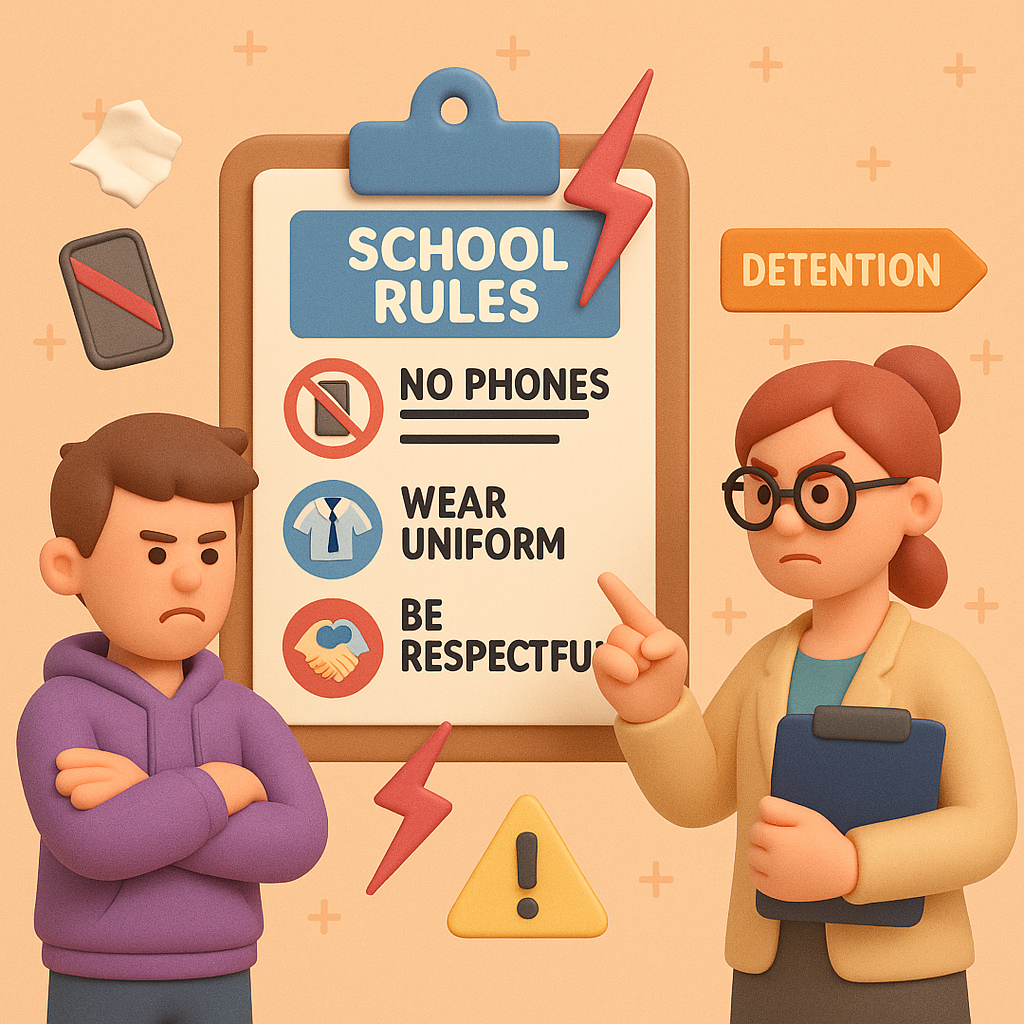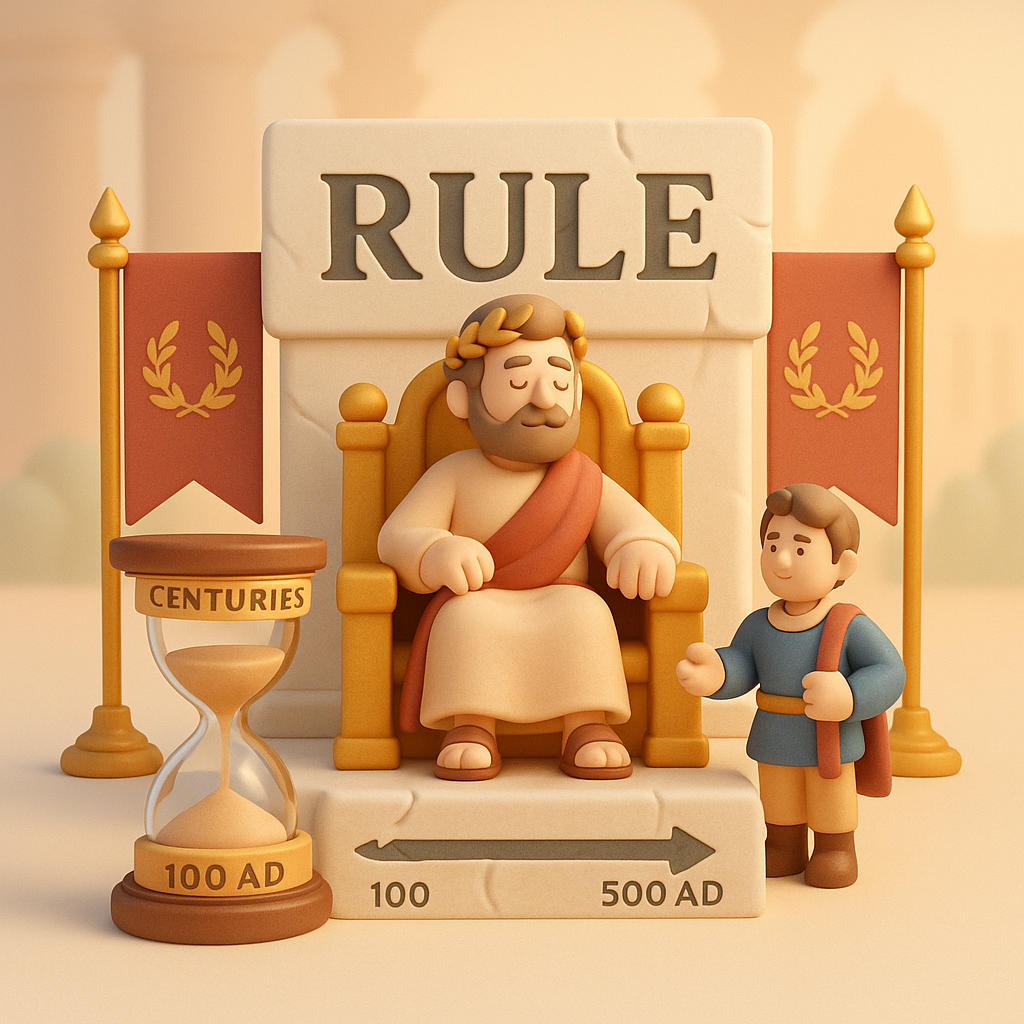Rule
Definition
Rule is a noun and a verb. As a noun, it refers to a regulation, principle, or guideline governing conduct or procedure. As a verb, it means to exercise authority or control over others or to make a formal decision.
Parts of Speech
- Noun
- Verb
Pronunciation
American English
- IPA Pronunciation: /ruːl/
- Respelling: ROOL
British English
- IPA Pronunciation: /ruːl/
- Respelling: ROOL
Etymology
The word "rule" originates from Old French "reule," derived from Latin "regula," meaning "straight stick, guideline, or principle." It entered Middle English in the 13th century.
Derivatives
- Ruler (noun)
- Rulership (noun)
- Unruled (adjective)
- Rulebook (noun)
- Overrule (verb)
Synonyms
- Regulation
- Guideline
- Command
Antonyms
- Anarchy
- Freedom
- None
Usage
The term "rule" is widely used in legal, social, and organizational contexts. Examples include "The company has a strict dress rule" (noun) and "The king rules the land with fairness" (verb).
Related Terms
- Law: A system of rules enforced by an authority.
- Regulation: A directive maintained by an organization or government.
- Order: A command or authoritative direction.
Detailed Definitions
Noun
- A regulation or principle: Refers to a directive governing conduct or procedure.
- Example: "Breaking the school’s rules will result in punishment."
- A governing standard: Refers to a guideline for behavior or action.
- Example: "The golden rule is to treat others as you wish to be treated."
- The exercise of authority: Refers to control or governance by a person or body.
- Example: "The empire’s rule lasted for centuries."
Verb
- To exercise authority or control: Refers to governing or directing.
- Example: "The queen rules the country with wisdom."
- To make a formal decision: Refers to issuing a judgment or verdict.
- Example: "The judge ruled in favor of the defendant."
- To dominate or prevail: Refers to having power or influence over something.
- Example: "Logic rules in this debate."
rule



🇨🇳 Mandarin
- 规则 (Rule as in instruction or direction): Guīzé
- IPA: /kweɪ˥˩ tsɤ˥˩/
- Respell: Kwei-tse
- 统治 (Rule as in control or dominion): Tǒngzhì
- IPA: /tʰʊŋ˥˩ ʈʂʐ̩˥˥/
- Respell: Tong-zhi
🇮🇳 Hindi
- नियम (Rule as in instruction or direction): Niyam
- IPA: /niːjəm/
- Respell: Nee-yam
- शासन करना (Rule as in control or dominion): Shasan karna
- IPA: /ʃaːsən kəɾnə/
- Respell: Shaasan kar-na
🇪🇸 Spanish
- Regla (Rule as in instruction or direction): Regla
- IPA: /ˈreɣla/
- Respell: Regh-la
- Gobernar (Rule as in control or dominion): Gobernar
- IPA: /gobeɾˈnaɾ/
- Respell: Gober-nar
🇫🇷 French
- Règle (Rule as in instruction or direction): Règle
- IPA: /ʁɛɡl/
- Respell: Regel
- Gouverner (Rule as in control or dominion): Gouverner
- IPA: /ɡuvɛʁne/
- Respell: Gouver-ne
🇸🇦 Modern Standard Arabic
- قاعدة (Rule as in instruction or direction): Qa'ida
- IPA: /qaːʔida/
- Respell: Qa-i-da
- حكم (Rule as in control or dominion): Hukm
- IPA: /ħukm/
- Respell: Hook-m
🇧🇩 Bengali
- নিয়ম (Rule as in instruction or direction): Niyom
- IPA: /nijɔm/
- Respell: Nee-yom
- শাসন করা (Rule as in control or dominion): Shashon kora
- IPA: /ʃaʃon kɔɹa/
- Respell: Shashon kora
🇷🇺 Russian
- Правило (Rule as in instruction or direction): Pravilo
- IPA: /prɐˈvʲilə/
- Respell: Pra-vee-lo
- Управлять (Rule as in control or dominion): Upravlyat'
- IPA: /ʊˈpravlʲɪtʲ/
- Respell: Oo-prav-liyat
🇵🇹 Portuguese
- Regra (Rule as in instruction or direction): Regra
- IPA: /ˈʁeɡɾɐ/
- Respell: Re-gra
- Governar (Rule as in control or dominion): Governar
- IPA: /ɡoveɾˈnaɾ/
- Respell: Gouver-nar
🇮🇩 Indonesian
- Aturan (Rule as in instruction or direction): Aturan
- IPA: /aturan/
- Respell: A-tu-ran
- Memerintah (Rule as in control or dominion): Memerintah
- IPA: /məmərintah/
- Respell: Muh-muh-reen-tah
🇩🇪 German
- Regel (Rule as in instruction or direction): Regel
- IPA: /ˈʁeːɡl̩/
- Respell: Ree-gel
- Herrschen (Rule as in control or dominion): Herrschen
- IPA: /ˈhɛʁʃən/
- Respell: Her-shen
🇯🇵 Japanese
- ルール (Rule as in instruction or direction): Rūru
- IPA: /ɾɯ̟βɾɯ̟β/
- Respell: Ru-ru
- 支配する (Rule as in control or dominion): Shihai suru
- IPA: /ɕiha.i sɯ̟ᵝɾɯ̟ᵝ/
- Respell: Shi-hai su-ru
🇻🇳 Vietnamese
- Quy tắc (Rule as in instruction or direction): Quy tắc
- IPA: /kwi˧ˀ˦j tak˧ˀ˦/
- Respell: Kwi tak
- Cai trị (Rule as in control or dominion): Cai trị
- IPA: /kai̯˧ˀ˦ʔ tɕi˧ˀ˦/
- Respell: Kai chi
🇰🇷 Korean
- 규칙 (Rule as in instruction or direction): Gyuchik
- IPA: /kju.tɕʰik̚/
- Respell: Kyu-chik
- 지배하다 (Rule as in control or dominion): Jibaehada
- IPA: /t͈ɕi.be̞.ɦa.da/
- Respell: Ji-bae-ha-da
🇹🇷 Turkish
- Kural (Rule as in instruction or direction): Kural
- IPA: /kuːɾaɫ/
- Respell: Koo-ral
- Yönetmek (Rule as in control or dominion): Yönetmek
- IPA: /jønetmek/
- Respell: Yon-et-mek
🇵🇰 Urdu
- قاعدہ (Rule as in instruction or direction): Qa'ida
- IPA: /qaː.ɪ.d̪aː/
- Respell: Qa-i-da
- حکمرانی کرنا (Rule as in control or dominion): Hukmrani karna
- IPA: /ɦʊkʊmːraːniː kəɾnə/
- Respell: Hukumrani kar-na





